The Manufacturing of Greta Thunberg – for Consent: The Inconvenient Truth Behind Youth Co-optation [ACT II]
Cory Morningstar
THE MANUFACTURING OF GRETA THUNBERG – FOR CONSENT: THE POLITICAL ECONOMY OF THE NON-PROFIT INDUSTRIAL COMPLEX [ACT II]
January 21, 2019
This is ACT II of the six-part series: The Manufacturing of Greta Thunberg – for Consent: The Political Economy of the Non-profit Industrial Complex
In ACT I of this new body of research I opened the dialogue with the observations of artist Hiroyuki Hamada:
“What’s infuriating about manipulations by the Non Profit Industrial Complex is that they harvest the goodwill of the people, especially young people. They target those who were not given the skills and knowledge to truly think for themselves by institutions which are designed to serve the ruling class. Capitalism operates systematically and structurally like a cage to raise domesticated animals. Those organizations and their projects which operate under false slogans of humanity in order to prop up the hierarchy of money and violence are fast becoming some of the most crucial elements of the invisible cage of corporatism, colonialism and militarism.”
The Manufacturing of Greta Thunberg – for Consent series has been written in two volumes.
[Volume I: ACT I • ACT II • ACT III • ACT IV • ACT V • ACT VI] [Addenda: I]
[Volume II: An Object Lesson In Spectacle • ACT I • ACT II • ACT III • ACT IV • ACT V] [ACTS VI & VII forthcoming]
Volume I:
In ACT I, I disclosed that Greta Thunberg, the current child prodigy and face of the youth movement to combat climate change, served as special youth advisor and trustee to the burgeoning mainstream tech start-up, “We Don’t Have Time”. I then explored the ambitions behind the tech company We Don’t Have Time.
In ACT II, I illustrate how today’s youth are the sacrificial lambs for the ruling elite. Also in this act I introduce the board members and advisors to “We Don’t Have Time.” I explore the leadership in the nascent We Don’t Have Time and the partnerships between the well established corporate environmental entities: Al Gore’s Climate Reality Project, 350.org, Avaaz, Global Utmaning (Global Challenge), the World Bank, and the World Economic Forum (WEF).
In ACT III, I deconstruct how Al Gore and the Planet’s most powerful capitalists are behind today’s manufactured youth movements and why. I explore the We Don’t Have Time/Thunberg connections to Our Revolution, the Sanders Institute, This Is Zero Hour, the Sunrise Movement and the Green New Deal. I also touch upon Thunberg’s famous family. In particular, Thunberg’s celebrity mother, Malena Ernman (WWF Environmental Hero of the Year 2017), and her August 2018 book launch. I then explore the generous media attention afforded to Thunberg in both May and April of 2018 by SvD, one of Sweden’s largest newspapers.
In ACT IV, I examine the current campaign, now unfolding, in “leading the public into emergency mode”. More importantly, I summarize who and what this mode is to serve.
In ACT V, I take a closer look at the Green New Deal. I explore Data for Progress and the targeting of female youth as a key “femographic”. I connect the primary architect and authors of the “Green New Deal” data to the World Resources Institute. From there, I walk you through the interlocking Business & Sustainable Development Commission, the Global Commission on the Economy and Climate, and the New Climate Economy – a project of the World Resources Institute. I disclose the common thread between these groups and the assignment of money to nature, represented by the Natural Capital Coalition and the non-profit industrial complex as an entity. Finally, I reveal how this has culminated in the implementation of payments for ecosystem services (the financialization and privatization of nature, global in scale) which is “expected to be adopted during the fifteenth meeting in Beijing in 2020.”
In the final act, ACT VI [Crescendo], I wrap up the series by divulging that the very foundations which have financed the climate “movement” over the past decade are the same foundations now partnered with the Climate Finance Partnership looking to unlock 100 trillion dollars from pension funds. I reveal the identities of individuals and groups at the helm of this interlocking matrix, controlling both the medium and the message. I take a step back in time to briefly demonstrate the ten years of strategic social engineering that have brought us to this very precipice. I look at the relationship between WWF, Stockholm Institute and World Resources Institute as key instruments in the creation of the financialization of nature. I also take a look at what the first public campaigns for the financialization of nature (“natural capital”) that are slowly being brought into the public realm by WWF. I reflect upon how mainstream NGOs are attempting to safeguard their influence and further manipulate the populace by going underground through Extinction Rebellion groups being organized in the US and across the world.
With the smoke now cleared, the weak and essentially non-existent demands reminiscent of the 2009 TckTckTck “demands” can now be fully understood.
Some of these topics, in addition to others, will be released and discussed in further detail as addenda built on the large volume of research. This includes stepping through the looking glass, with an exploration of what the real “Green New Deal” under the Fourth Industrial Revolution will look like. Also forthcoming is a look at the power of celebrity – and how it has become a key tool for both capital and conformity.
[*Note: This series contains information and quotes that have been translated from Swedish to English via Google Translator.]
A C T T W O
We Don’t Have Time Players
The We Don’t Have Time board of directors is comprised of the following people:
- Ingmar Rentzhog, We Don’t Have Time founder and CEO
- Anette Nordvall, We Don’t Have Time chairwoman/shareholder, private tech investor, works with STOAF (venture capital and private equity firm in Sweden), venture partner with Capital A Partners
- David Olsson, We Don’t Have Time chief operating officer, chairman of the Swedish climate think tank Global Utmaning
- Christian Emmertz, We Don’t Have Time co-founder, business unit director at Hewlett Packard (HP) Sweden, partner at RealCap Investment, The Climate Reality Project leader, trained by Al Gore
- Stella Diesen, “Changing the world with Microsoft tech Innofactor” (formerly Microsoft), The Climate Reality Project leader, trained by Al Gore
- Gustav Stenbeck, CEO of Mestro, founder and executive chairman of Gain Sustain (investment banking)
Global Utmaning, which translates to Global Challenge in English, was founded in 2005 by economist Kristina Persson, Sweden’s former Minister of Strategic Development and Nordic Cooperation. Persson was tasked with building cooperation with Nordic countries in order to leverage strength within the international community (“together we are an actor with clout”). Her position involved the fostering of long-term development for “the green transition, jobs and distribution, and initiatives to influence the global agenda for sustainable development.” [Source] She is heir (with her siblings) to the business empire established by her father, Sven O. Persson which has a revenue of approximately SEK 3 billion USD (approx. USD 332,500,000.00) per annum. Persson is also the founder of the Freja Foundation established in 2017.
The We Don’t Have Time Foundation board of directors include:
- Cathy Orlando, national director, Citizen’s Climate Lobby in Canada
- Stuart Scott, The Climate Reality Project leader, trained by Al Gore
- Per-Espen Stokenes, researcher in behavioural economics
- Ingmar Rentzhog, founder and CEO, We Don’t Have Time
- David Olsson, chief operating officer, We Don’t Have Time
- Greta Thunberg, special youth advisor and trustee
- Jamie Margolin, special youth advisor and trustee
Acquisition International Magazine Issue 10, 2018

“Citizen Climate Lobby international outreach manager Cathy Orlando, centre, is pleased with the Trudeau government’s new carbon tax plan. She’s seen here with former U.S. Vice President Al Gore, husband Sanjiv Mathur, and their daughter Sophia Mathur. (Supplied)” [Source]
The We Don’t Have Time advisory board includes the following individuals:
- Daniela Rogosic, global press officer, the IKEA Group
- Tove Ahlström, CEO of Global Utmaning, affiliate of Al Gore’s The Climate Reality Project
- Anna Svahn, CEO of Feminvest, CEO and co-founder at Cygnus Capital [http://annasvahn.se]
- Andra Farhad, founder and CEO of Borshajen
- Kaj Török, chief reputation officer and chief sustainability officer of Max Burgers, co-founder of Futerra Marketing and Advertising
- Sweta Chakraborty, renowned risk and behavioural scientist (behavioural change) [Bio]
- David JP Phillips, founder of davidjpphillips.com, speakerrating.com and presentationsteknik.com. (Phillips delivers training in presentation skills in over 16 countries. His expertise is based on the latest research in neurology, psychology, and biology as a means of effective storytelling and communicating.)

The presence of Ikea on the We Don’t Have Time advisory board should be duly noted. In 2017 Ikea awarded a $44.6m grant from the IKEA Foundation to the We Mean Business coalition (founded in 2014). This grant was in fact “the second largest single donation ever made by the charitable arm of retail giant IKEA.” The We Mean Business coalition founding members include The B Team, the Business for Social Responsibility (BSR), the Carbon Disclosure Project, Ceres, The Climate Group, the World Business Council for Sustainable Development (WBCSD), and the Prince of Wales Corporate Climate Group. Other We Mean Business partners include the United Nation Global Compact, the United Nations Environment Programme (UNEP), UNEP Finance, the World Bank, and World Wildlife Fund. [Full list] [Further reading:“100 Billion for Everyone Who Signs”]
The B Team is managed by Purpose, the for-profit public relations firm run by Avaaz co-founder Jeremy Heimans, co-author of the book “New Power”. Ikea is a client of Purpose and partner to the Purpose NGO “We Are Here Now” (“Here Now”).
In the following excerpt from the January 28, 2016, Maclean’s article, Have We Hit ‘Peak Stuff?’ Ikea Says There’s Röom to Grow, the collective corporate climate fervor now sweeping the globe is demonstrated once again:
“So how to square Ikea’s “peak stuff” talk with its “buy more” actions? A spokesperson volunteered in an email that [Steve] Howard’s [head of sustainability at Ikea] comments were made as “part of a wider global context where many people still have very limited means” while Sjostrand suggested the goal was “to continue to grow our business, but grow it in a more sustainable way.” Translation: Ikea will sell you more furniture and home furnishings, but it will try harder not to make you feel guilty about it. Which explains why the company’s corporate reports are festooned with examples of sustainability initiatives, from selling only LED-compatible lighting to serving responsibly harvested fish in the cafeteria.”
Sustainability and capitalism are like oil and water. The two are incompatible. They cannot co-exist.
The “climate revolution” sought by We Don’t Have Time et al doesn’t contract mass-consumption, it delivers new products in order to expand it.
The “clean energy revolution” doesn’t threaten big oil – it secures it. It doesn’t weaken capitalism. It strengthens it. It doesn’t inspire resistance – it quells it – into oblivion.
Here we can reflect on the most simple things that shed light on the ideologies shared by the majority of those at the helm of decision making in addressing our climate crisis. In plain sight, what companies and institutions a person is most interested in are made public on one’s LinkedIn account. Selected groups to follow shared by the average non-profit industrial complex (NPIC) professional, are rarely if ever groups, institutions or people working within the realms of ecology, Indigenous rights, social justice, environmental sciences, or other critical areas associated with climate change and environmental depletion. Nor are smaller institutions or individuals working toward small-scale local solutions of any interest.
Rather this interlocking directorate of “Ted talkers” and “thought leaders” most commonly select and follow the world’s most powerful and successful finance and tech companies, and the marketing firms that propel them to their success. Rarely are institutions, groups or people within the environmental sciences of interest, nor are smaller institutions or individuals working toward small-scale local solutions. The most popular institutions followed, and shared by most of this crowd, are comprised of white Western leadership, predominantly male. Some of the most admired ones chosen by the many are the World Economic Forum, the Bill and Melinda Gates Foundation, the United Nations Framework Convention on Climate Change (UNFCCC), the Economist, the Green Climate Fund – groups and institutions they wholly identify with, and seek to assimilate/belong.
Here we must recall the fact (disclosed in ACT I) that Al Gore’s Climate Reality Project is a partner to We Don’t Have Time. (Al Gore’s priorities to be discussed in ACT III.)
“Rentzhog wants to affect ‘change within business, not against business.'” — Anette Nordvall, Chairman of We Don’t Have Time [Source]
The Sacrificial Lambs
“The same hormones and neurotransmitters can be released by a good story. These include dopamine, oxytocin, and endorphins, which Phillips refers to as the “angel’s cocktail.” The effects of oxytocin make you more generous, trusting, and ready to bond. This is what is released in your blood when you hear a sad story. It makes us feel relaxed and more human as we bond to the storyteller.” — based on the TEDxStockholm Talk, “The Magical Science of Storytelling,” by David JP Phillips, We Don’t Have Time board of directors [Source]
To begin this segment, we can look at the “WE” movement (“ME to WE”, Free the Children and WE Day). [1] The 2015 exposé “Unleashing Voluntourism” produced by the Canadian Public Broadcasting (CBC) was originally scheduled to air on March 19, 2015. The documentary investigated the privatization of, the NGOization of, and the explosive growth of, what has morphed into a billion dollar industry – tourism masquerading as volunteerism – for privileged youth in the West.
Celebrity, fetishized in an rapidly eroding society void of meaning and culture, has resulted in such a powerful asset to capitalism and militarism, that the subject has become an active area of study by academics such as Dan Brockington and Ilan Kapoor. The power of celebrity was not lost on WE whose keynote speakers for massive gatherings and endorsements have included: Canadian Prime Minister, Justin Trudeau in 2008 (video), and again, in 2015 following Obama’s election win, former “first lady” Michelle Obama, Hollywood’s Natalie Portman, and a stream of others. Indeed, renting celebrities for galas and events has too become a niche industry.
Shortly before it was to air, the documentary was pulled after WE requested unauthorized footage be removed from the exposé. When it did air, on April 7, 2017, two scenes had been cut from the film. The following clip is one of the two deleted clips (running time: 1m:1s), “Volunteers Unleashed: suppressed Me to We clip #1″:
The controversy regarding WE is far from over as the NGO grapples to protect its million dollar brand. On January 17, 2019, WE announced they would commence legal action against a small podcast network and news outlet in Manitoba, Canada, where journalists have no explicit legal protection from SLAPP lawsuits (Strategic Lawsuits Against Public Participation). This news outlet had been reporting on the WE movement since 2015.
The following images and brief commentaries are but a tiny glimpse into the world of NGOization and co-optation of both resistance and youth. Today we bear witness to what can aptly be described as the mechanisms and orchestrated movements of the non-profit industrial spectacle.
To illustrate the co-optation of youth, we will now look at the celebrity youth activists and Climate Reality leaders Greta Thunberg and Jamie Margolin. We focus on these two individuals as they are directly connected to the We Don’t Have Time campaign and business plan.
 The Climate Reality Project and Global Utmaning. Greta Thunberg at far left. “How do we ensure that today’s decision-makers benefit and learn from young people’s commitment to the future? On September 26, the question attracted over 250 visitors to Kulturhuset Stadsteatern where Global Utmaning and Al Gore’s Climate Reality Project arranged seminars.” [Source]
The Climate Reality Project and Global Utmaning. Greta Thunberg at far left. “How do we ensure that today’s decision-makers benefit and learn from young people’s commitment to the future? On September 26, the question attracted over 250 visitors to Kulturhuset Stadsteatern where Global Utmaning and Al Gore’s Climate Reality Project arranged seminars.” [Source]
Thunberg has stated repeatedly that her strike will continue “until Sweden is aligned with the Paris Agreement.” Therefore, by her own statements, this is the singular, overall purpose and goal of the strike. The foundation of the Paris Agreement is the expansion of nuclear, the financialization of nature, further privatization at an unprecedented scale, “large scale CO2 reduction” (carbon capture storage), a desperate attempt to revitalize economic growth, and more market “solutions” that will further perpetuate our multiple crises. Therefore, the Thunberg campaign is in part to create a demand upon governments across the globe to align with the Paris Agreement. (A demand to obtain what the ruling classes have already decided to unleash on us, our planet, and all life.) As adherence to the Paris Accords is a running theme in the mainstream NGO movement, the marketing campaign is helped along by 350.org, Avaaz, WWF, Greenpeace, in tandem with the UN (“Changing Together”), the World Bank (“Stepping Up“)[2], and more recently, the World Economic Forum (WEF).
The Global Utmaning think tank cites its main asset as its network of over 90 senior advisors. From its homepage:
“The global market economy has lifted millions of people out of poverty. Meanwhile, inequality increased significantly. The financial system must be globally regulated and the current economic stagnation broken. It requires a new green, circular and inclusive growth model that creates value, labor and welfare. What is tomorrow’s new economic story?”
Global Utmaning recently announced a partnership with Global Shapers – an initiative of the World Economic Forum that brings together young leaders worldwide: “The World Economic Forum Annual Meeting 2019 will be held from 22-25 January in Davos-Klosters, Switzerland. Over 3,000 global leaders will come together under the theme Globalization 4.0: Shaping a Global Architecture in the Age of the Fourth Industrial Revolution.” [Emphasis added]
AVAAZ
Here we will make some brief observations of both Avaaz and 350.org in relation to the global “Climate Strike” campaigns. An exhaustive body of research that lays bare the function and ancestry of both NGOs, based on investigations from 2012 to present, now exists on the Wrong Kind of Green website. I encourage readers to familiarize themselves with the two entities.
On December 14, 2018, 350.org sent out a press release containing the following excerpts:
“Katowice, Poland – Today- 30 school children from three local schools in Katowice, answered the call of Greta Thunberg and brought the global #ClimateStrike into the final day of the UN Climate talks in Katowice.
The 30 students were granted special access to enter the UN talks and carry their message to the delegates and Polish government: with only 12 years left to get the world off fossil fuels, leaders must act now.” [emphasis in original]
On cue, the international media would publish photos such as this one:
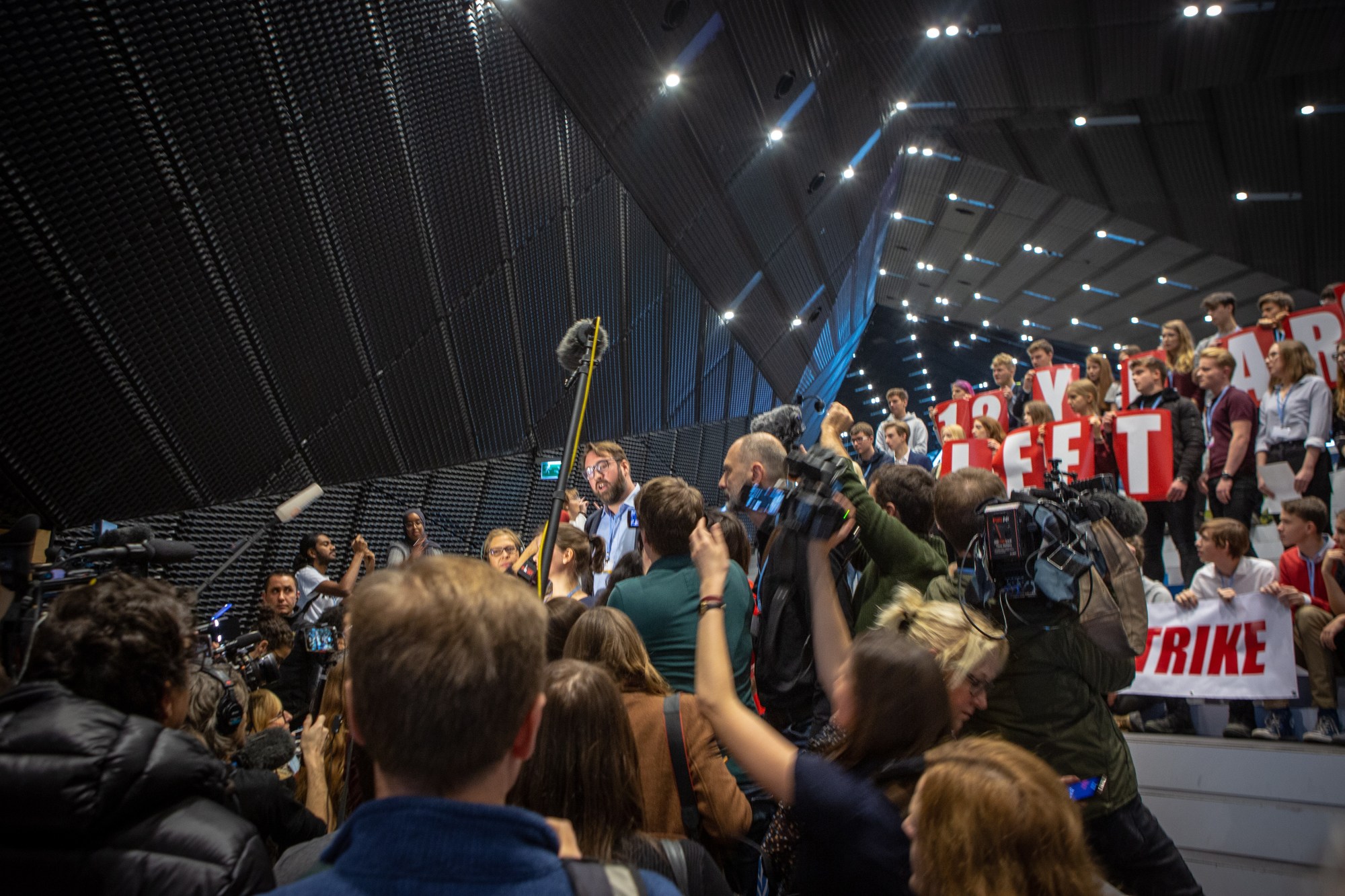 And here, we see a media franzy, clamouring to get the attention of a single man. The youth stand silent, ignored in the background. Yet the youth were supposed to have been exactly what the action was about. "Adults sometimes forget about the young people," said Ma?gorzata Czachowska, one of the Polish students inspired by Thunberg." Photo: David Tong / WWF New Zealand
And here, we see a media franzy, clamouring to get the attention of a single man. The youth stand silent, ignored in the background. Yet the youth were supposed to have been exactly what the action was about. "Adults sometimes forget about the young people," said Ma?gorzata Czachowska, one of the Polish students inspired by Thunberg." Photo: David Tong / WWF New Zealand
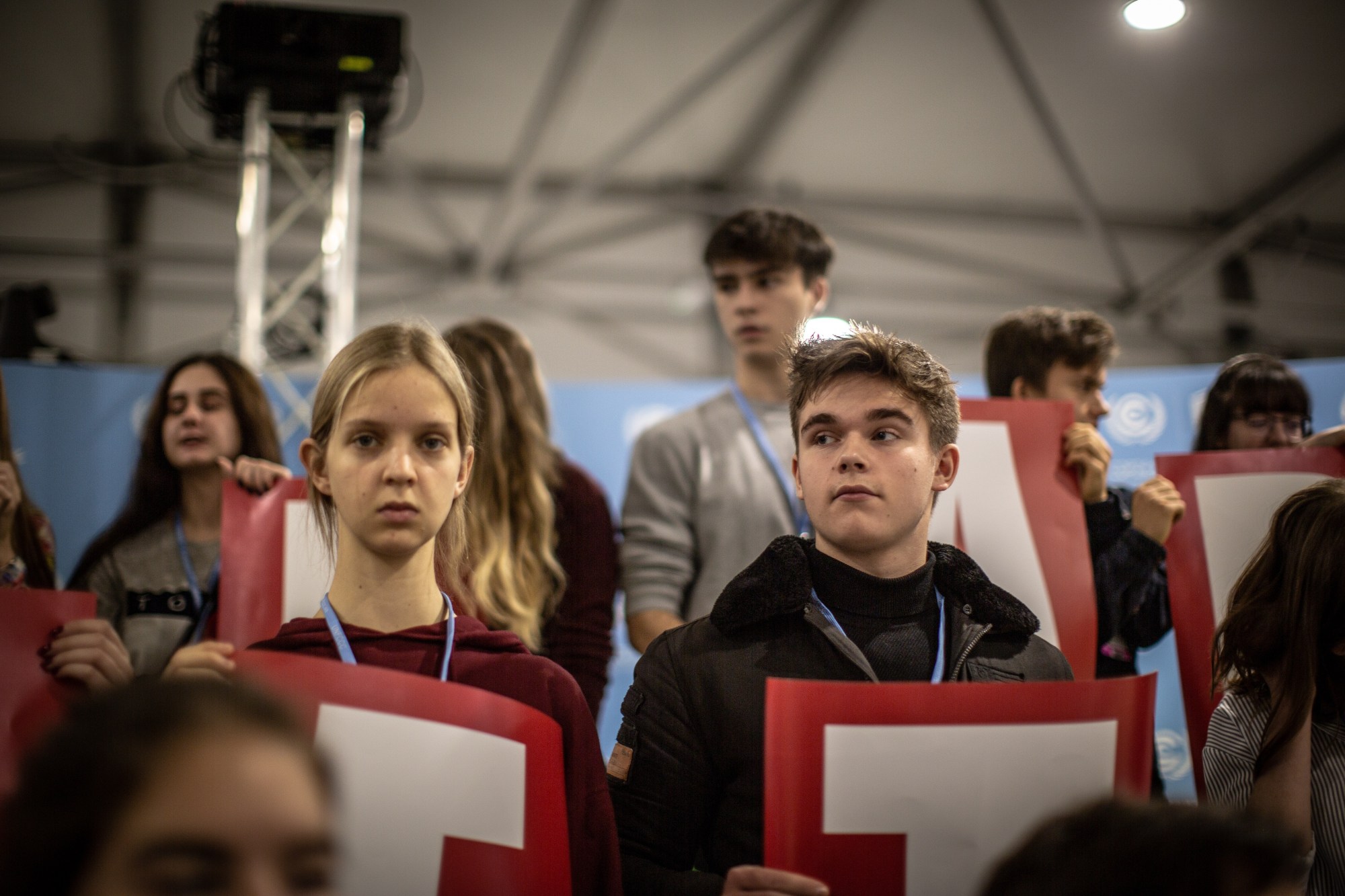
Here we have youth - bored out of their minds. Is this activism? Is this what revolution looks like? Photo: David Tong / WWF New Zealand
At the bottom of the 350.org press release under the heading “For more information”, the press release discloses: “NOTE that 350.Org and Avaaz are NOT organising these actions but are helping the students to spread their message.” [Emphasis in original]
And yet it certainly appears that Avaaz did in fact play a leading role in organizing the action – while orchestrating the media spotlight. [See photos in the above slider.]
On the day following the 350.org-Avaaz press release, December 15, 2018, NGOs and institutions alike scrambled to catapult the words of Thunberg into the hearts and minds of citizens all over the world. From the UN, to Avaaz, to the World Bank, to grass roots resistance, they all clamoured to spread young Thunberg’s words. But one NGO took it upon itself to redact many of Thunberg’s words, releasing an abbreviated version (79K views on Facebook). With no disclaimer to its audience, Avaaz removed four excerpts from Thunberg’s speech. [4] The two excerpts that follow, which were cut by Avaaz, are most revealing:

Two of the excerpts that have been cut from Greta’s speech, are most revealing:
“You only speak of the green eternal economic growth because you are too scared of being unpopular. You only talk about moving forward with the same bad ideas that got us into this mess, even when the only sensible thing to do is pull the emergency brake.”
“But I don’t care about being popular. I care about climate justice and the living planet. Our civilisation is being sacrificed for the opportunity of a very small number of people to continue making enormous amounts of money.”
It is not surprising Avaaz would strike Greta’s comments considering a primary function of Avaaz is to promote market solutions that accelerate “green” economic growth – in servitude to “a very small number of people to continue making enormous amounts of money.”
In the following Avaaz campaign, the NGO employs Thunberg’s face to place pressure on Sweden for corporate non-solutions, such as in this instance, “large scale CO2 reduction”. This is holistic framing for carbon capture storage technologies.
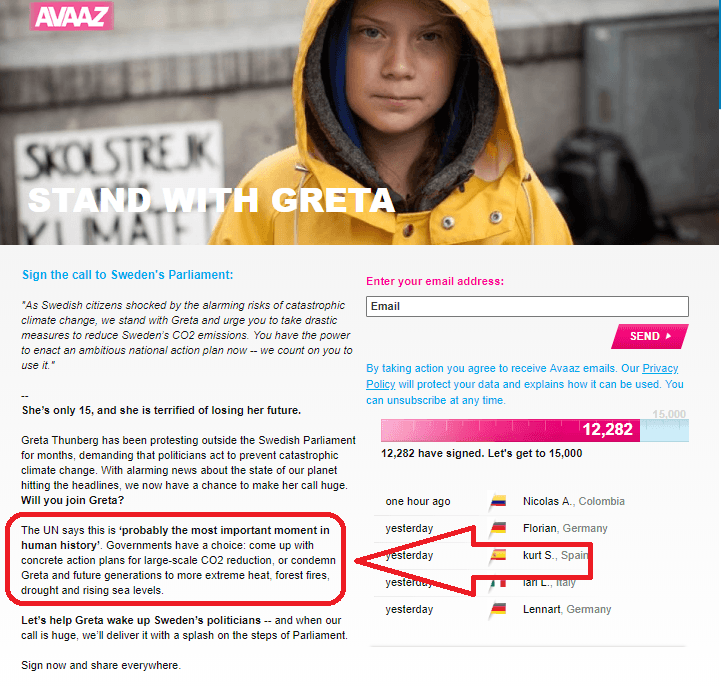 Here it is imperative to refer to the August 24, 2017 press release “Bellona seminar on Nordic CCS cooperation”. From the release:
Here it is imperative to refer to the August 24, 2017 press release “Bellona seminar on Nordic CCS cooperation”. From the release:
“Now politicians have to go ahead so that we can build full-scale CO2 capture facilities as quickly as possible,’ said Tandberg. Three full-scale facilities in Norway are planned, but not yet granted, with a preliminary price tag of NOK 12.6 billion (EUR 1.28 billion)…
Norway is leading in capture, transportation and storage technologies, and can export the knowledge and facilities. There is potential for a completely new industry to be built. However it depends on whether Norway is able to keep its position. It is urgent to build the CCS plants, develop the technology further and get full-scale CCS infrastructure, and a Nordic cooperation can facilitate this process.”
This is a prime example of one of the main functions of NGOs. To generate popular demand from the citizenry that will in turn support the legislation required for projects that serve to benefit industry, rather than people and planet. Prior to the contracts being signed or a shovel breaking ground to build the infrastructures that will comprise the “global architecture in the age of the fourth industrial revolution” – legislation is required. And just like a proverbial snowball turning into an avalanche, the legislation begets money for a budget with bidding and construction to commence shortly thereafter.
What better way to create a demand for something detrimental to both the environment and the populace, than to package it under climate change solutions, with the lovely and innocent face of Greta. With reality turned on its head, industry doesn’t have to impose its will on the people – the people will impose it on themselves, via Avaaz et al. The people are thus engineered to demand the very false solutions that the corporations have had up their sleeves for years and even decades.
Hence, the non-profit industrial complex and the media, both financed/funded by the word’s power elite, are amalgamated with and by corporate power. Together they work in unity, toward one common goal: economic growth. Hence, market solutions are always THE solutions. It is not simply a matter of placing the economy first before everything else. Rather, its placing the economy first at the EXPENSE of everything else. And everyone else. And all life on this planet.
To look at the scale of such so-called solutions, one need look no further than the 2013 Carbon Tracker “Unburnable Carbon Report” – page 12:
“Given that the average annual rate of storage in 2015 is projected by the Global Carbon Capture and Storage Institute (2012) to be about 2.25 million tonnes for 16 CCS projects, a total of nearly 3800 CCS projects would need to be operating by 2050 under the idealised scenario.”
The idealised scenario “offers about an 80% chance of not exceeding a warming of more than 2°C.”
May 14, 2015:
“As with all the shaping of our shared futures by the elite, the pathway to CCS is clear in the 2008 Green Alliance paper, A Last Chance for Coal, with contributions from Ben Caldecott while at the Policy Exchange think tank. The paper notes that it is critical Europe’s commitment to CCS be realized before 2020; 12 short years away from the paper’s publication date. The year 2020 is a critical date of vast significance – a recurring deadline for all environmental market solutions to be in place.”
[Further reading: AVAAZ: The Globe’s Largest & Most Powerful Behavioural Change Network]
[Further reading: McKibben’s Divestment Tour – Brought to You by Wall Street]
Jamie Margolin – Zero Hour
Jamie Margolin is the teenage founder of This Is Zero Hour and “one of the 13 plaintiffs suing Washington State for its failure to take adequate action on climate change.” (As disclosed in ACT I of this series, Margolin – and her NGO Zero Hour – accounted for two of the six accounts tagged by We Don’t Have Time on the very first post reporting Greta Thunberg’s school strike.) Margolin attended Al Gore’s Climate Reality Leadership Corps (a three-day conference) that took place in Seattle on June 27-29, 2017. [Source] In July 2017, Margolin began organizing for a youth climate march in Washington, D.C. and launched Zero Hour. On February 27, 2018, exactly eight months after her first day at the Climate Reality Leadership Corps, Margolin would be featured in Rolling Stone magazine. Prior to her meteoric rise to stardom, Margolin interned in Hillary Clinton’s campaign office in Seattle. The following passage demonstrates what has now become the normal corporate promotion of youth:
“The youngest speaker at the Global Climate Action Summit in San Francisco this week is Jamie Margolin of Seattle, who founded the Zero Hour youth climate march this past July and led its flagship action in Washington, D.C. At 16, Margolin presents a youthful contrast to most of the GCAS leadership, like California Governor Jerry Brown (80); former New York City Mayor Michael Bloomberg (76); and China’s top climate diplomat, Xie Zhenhua (68).” [Source]
In the 21st century manufactured movements and revolutions, today’s “leaders” (fabricated by corporate owned and funded media) are no longer enemies of the establishment. Rather, they do events together – with establishment figures such as New York City Mayor, Bill de Blasio adulating over our new “revolutionaries” while tagging them and tweeting their praises. When the establishment itself loves our movements and our “faces of the future” – we know we have already lost tomorrow.
 “Donate”: Jamie Margolin, teenage founder of This Is Zero Hour | Climate Reality Project webpage banner
“Donate”: Jamie Margolin, teenage founder of This Is Zero Hour | Climate Reality Project webpage banner
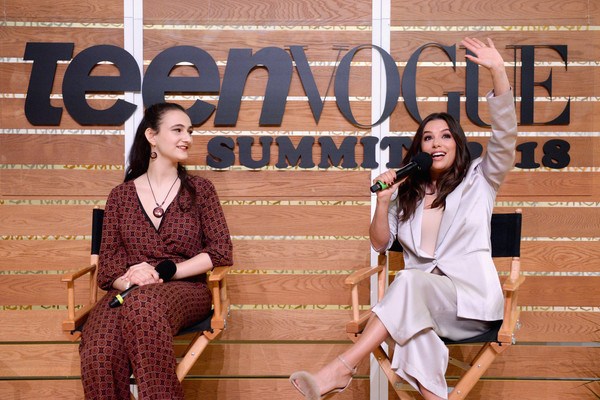 On cue. On December 5, 2018, Time Magazine voted Greta Thunberg as one of the most influential teens (now the most sought after and targeted demographic by corporations) of 2018 while Jamie Margolin, founder of Zero Hour, Climate Reality leader and teen influencer, was lauded over by Teen Vogue. [July 19, 2018, Climate Change Puts the Future at Risk, So I’m Taking Action; November 5, 2018, 21 Under 21: Jamie Margolin Knows Climate Justice is the Key to All Justice; December 1, 2018, The Teen Vogue Summit 2018]
On cue. On December 5, 2018, Time Magazine voted Greta Thunberg as one of the most influential teens (now the most sought after and targeted demographic by corporations) of 2018 while Jamie Margolin, founder of Zero Hour, Climate Reality leader and teen influencer, was lauded over by Teen Vogue. [July 19, 2018, Climate Change Puts the Future at Risk, So I’m Taking Action; November 5, 2018, 21 Under 21: Jamie Margolin Knows Climate Justice is the Key to All Justice; December 1, 2018, The Teen Vogue Summit 2018]
December 5, 2018, Teen Vogue: “15-Year-Old Activist Greta Thunberg Schooled World Leaders on Climate Change at a United Nations Summit”

In this image, Margolin lends her celebrity status to prop up the brands Global Citizen and Johnson & Johnson.
Global Citizen is perhaps the most egregious NGO in the non-profit industrial complex with its grotesque model of shallow, hollowed-out “activism” and corporatization. Recently Global Citizen has introduced “points” that can be accumulated by clicking on actions. In a blatant emulation of credit cards (the more money you spend, the more points you acquire), the more actions you click, the more points you acquire. These points can then be redeemed for access to celebrity events and concerts.
This is the social engineering of unquestioning compliance and instantaneous acquiescence. In order to receive the reward, one must perform the action requested. If you do not comply, you simply do not receive the points. Here, the encouragement for critical thought and debate is deliberately and strategically erased from the equation.
NGOs are not the only entities to exploit youth. Corporate partners that finance their endeavours also provide lofty sums of money to have their toxic legacies greenwashed. In July 2018, Johnson & Johnson was ordered to pay “nearly $4.7 billion US in total damages to 22 women and their families after they claimed asbestos in Johnson & Johnson talcum powder contributed to their ovarian cancer, in the first case against the company that focused on asbestos in the powder… Six of the 22 plaintiffs in the latest trial have died from ovarian cancer. … Mark Lanier, lead counsel for the plaintiffs, said in a statement that Johnson & Johnson had covered up evidence of asbestos in their products for more than 40 years.” [Source]
Par for the course, partnerships and endorsements for corporations inflicting violence upon both children and planet are a hallmark of the non-profit industrial complex. This is not the only lawsuit that has been launched against Johnson & Johnson nor will it be the last. There are also 1200 pending lawsuits in the US alone against this corporate entity. Johnson & Johnson is not the exception – it is the norm.
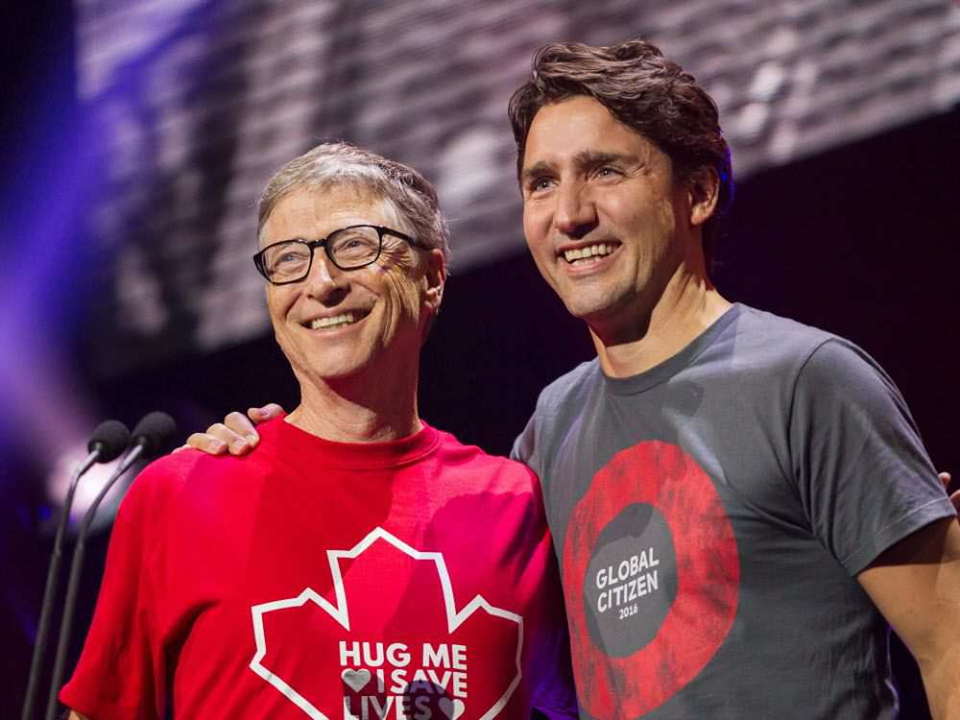 TWO PHONIES AND WORLD CLASS CRIMINALS: Bill Gates (Breakthrough Energy, Mission Innovation) with Canadian Prime Minister Justin Trudeau for Global Citizen. Montreal, Quebec, Canada, September 17, 2016. (REUTERS/Geoff Robins/POOL)
TWO PHONIES AND WORLD CLASS CRIMINALS: Bill Gates (Breakthrough Energy, Mission Innovation) with Canadian Prime Minister Justin Trudeau for Global Citizen. Montreal, Quebec, Canada, September 17, 2016. (REUTERS/Geoff Robins/POOL)

June 30, 2017, Twitter: Jamie Margolin – teenage founder and executive director of This Is Zero Hour, founded in 2017
Jamie Margolin, speaking via Skype at the Climate Emergency Plan presentation, (We Don’t Have Time, Global Utmaning, the Club of Rome), November 24, 2018:
“We don’t just think about, oh there’s carbon in the air and we need to lower it, we think of how did the carbon get there?, like how did we allow a system that could lead us to such destruction?”
The system that Margolin refers to is that of global capitalism, an economic system that is devouring everything in its path. A promise to destroy the planetary ecosystems of our shared futures. And it’s not as though Margolin has not begun to understand the glaring systems intersecting at the nexus of our multiple crises, such as capitalism, colonialism, racism and patriarchy.
Rather, Margolin does in fact possess the basic building blocks of knowledge that are required for the long road ahead of instilling and inspiring the revolutionary changes that are required amoungst the youth. Yet, by positioning herself with those that bring into fruition and profit from everything Margolin touches upon, she tragically denigrates her own analysis by merely calling for better cups for Starbucks rather than the elimination of Starbucks altogether. Hence, on her current path, Margolin does more harm than good for the very systemic issues she articulates so well.
With “crude capitalists“, such as Gore, de Blasio and others, now capturing the last vestiges of youth that even have such awareness (an awareness that is slowly dying out), soon the systemic structures that allow capitalism and oppression to flourish will have no opposition whatsoever. We are reaching the point where there is no distinction between our “movements” and the coalitions created to further our oppression and servitude. The fact that Margolin serves as a face for Al Gore’s Climate Reality Project – when saving capitalism is Gore’s number one priority (as we will learn in ACT III), grinds all of Margolin’s articulate words – and actions – to dust. Gore uses Greta, Margolin and all the youth they mobilize – by destroying the very futures these youth are hoping to save – all in servitude to economic growth and capitalism for the world’s power elite.
Also of relevance to the Thunberg campaign is the race to capture the Millennial and Generation Z. With increasing frequency, this capture is primarily achieved by the manufactured and heavily funded youth “movements”. “Movements” teeming with potential consumers, fully exploitable by those that benefit from, and in many cases contribute to, the steady stream of funding. The title Generation Z has been applied to those connected from birth to online media, to whom “instant gratification is the norm.” Today, this demographic is the most powerful and sought after audience in North America. As an illustration of the terms popularity, Zero Hour’s Margolin actually refers to herself as “Generation Z.”
The November 8, 2018 Barclays article, Gen Z: Step Aside Millennials reports that this demographic (children born between 1995 and 2009), the same demographic that youth leaders like Greta Thunberg and Jamie Margolin belong to, appeal to and influence, are quickly becoming the new “consumer giants” and “mega influencers”:
“By 2020, Generation Z will be the largest group of consumers globally. They will account for 40% of consumers in the US, Europe and BRIC countries and 10% in the rest of the world. Companies that don’t engage with Gen Z successfully could rapidly lose market share. Some of them may only be 9 years old, but Gen Z already have huge spending power. In the US, Gen Z currently have $200 billion in direct buying power but $1 trillion in indirect spending power by influencing household spending*. Gen Z’s advanced digital knowledge and ability to assess factors such as price and availability from a young age make them increasingly influential in family spending decisions.”
In the eyes of bankers and capitalists, this group of youth are mere consumers. Dollar signs. Not children, youth or even people.
Faux activism comes with many perks inclusive of six-figure salaries, jet-setting, and “Ted Talks”. Plus, the best hipster eco-brands money can buy. Perhaps the most enticing perk – is access. Access to the halls of power. With the media fawning all over every reformist word, the faux activist can fall in love with his/her/x own image all over again. Everyone wants to be a star. Everyone wants to live the luxurious life. Everyone wants to belong to the champagne circuit.
All on the backs of the most oppressed. All on the backs of the most vulnerable. Yet the paradox is this – we are their vehicle. Our resistance captured and channeled directly back into the very systems crushing us.
A Coup De Grace
Greta Thunberg is being strategically exploited by the World Bank, the UN, and the non-profit industrial complex that serves the ruling classes. They are using her to advance their own self-interests and objectives – that are in direct opposition to everything this young woman brilliantly articulates. This is being presented as a “leaderless movement” – very much the “New Power” methodology and religion for the capitalists – theorized by Jeremy Heimans (Avaaz/Purpose) for mass movement building – that serves the most powerful and destructive forces on the planet.
The manipulation of young, malleable minds is at the foundation of Western indoctrination in order to insulate a failing system and mask the market solutions being designed to address it. Market “solutions” that benefit the rich at the expense of the environment. Hence, the youth are always the sacrificial lambs of the non-profit industrial complex.
[Further reading: From Stable to Star – The Making of North American “Climate Heroes”]
[Further Reading: Targeting Millennials: The 30 Trillion Dollar Jackpot]
[Further Reading: The Pygmalion Virus in Three Acts [2017 AVAAZ SERIES, PART II]
End Notes:
[1] “According to WE.org, ‘WE is made up of WE Charity and ME to WE. Both are part of the WE Movement, also known as ‘WE’ and ‘We.'” – “WE Charity used to be called Free The Children, and before that, Kids Can Free The Children. ME to WE is a private, for-profit business, but WE prefers to call it a ‘social enterprise.'” [Source]
[2] The COP24 Stepping Up Climate Action is a campaign initiated by the UN with Connect4Climate. The campaign of “global leaders, thinkers, activists and influencers” includes Greta Thunberg. “Connect4Climate is a global partnership program under the Communication for Climate Change Multi-Donor Trust Fund of the World Bank Group. The Trust Fund was initiated by the Italian Ministry of Environment, and in 2014 it was joined by the German Federal Ministry for Economic Cooperation and Development.”
[3] Video: Greta & Svante Thunberg – Straight Talk, Dec 9, 2019 [ 15:31 in]; Grist, December 5, 2018: “I will sit there every Friday until Sweden is aligned with the Paris Agreement,” she told a packed auditorium in Katowice.
[4] 1) “You only speak of the green eternal economic growth because you are too scared of being unpopular. You only talk about moving forward with the same bad ideas that got us into this mess even when the only sensible thing to do is pull the emergency brake.”
2) “But I don’t care about being popular. I care about climate justice and the living planet our civilisation is being sacrificed for the opportunity of a very small number of people to continue making enormous amounts of money.”
3) “Until you start focusing on what needs to be done rather than what is politically possible, there is no hope. We cannot solve a crisis without treating it as a crisis.”
4) “We have run out of excuses and we are running out of time.”
Edited with Forrest Palmer, Wrong Kind of Green Collective.

This work is licensed under a Creative Commons Attribution-NonCommercial 4.0 International License
ALL CAPTIONS AND PULL QUOTES BY THE EDITORS NOT THE AUTHORS
Read it in your language • Lealo en su idioma • Lisez-le dans votre langue • Lies es in Deiner Sprache • Прочитайте это на вашем языке • 用你的语言阅读
[google-translator]
 Keep truth and free speech alive by supporting this site.
Keep truth and free speech alive by supporting this site.
Donate using the button below, or by scanning our QR code.
And before you leave
THE DEEP STATE IS CLOSING IN
![]() The big social media —Google, Facebook, Instagram, Twitter—are trying to silence us.
The big social media —Google, Facebook, Instagram, Twitter—are trying to silence us.

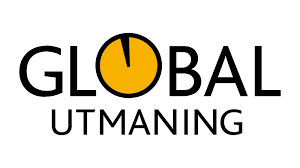
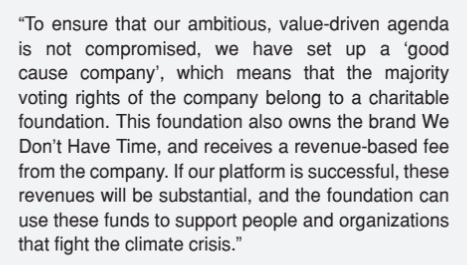

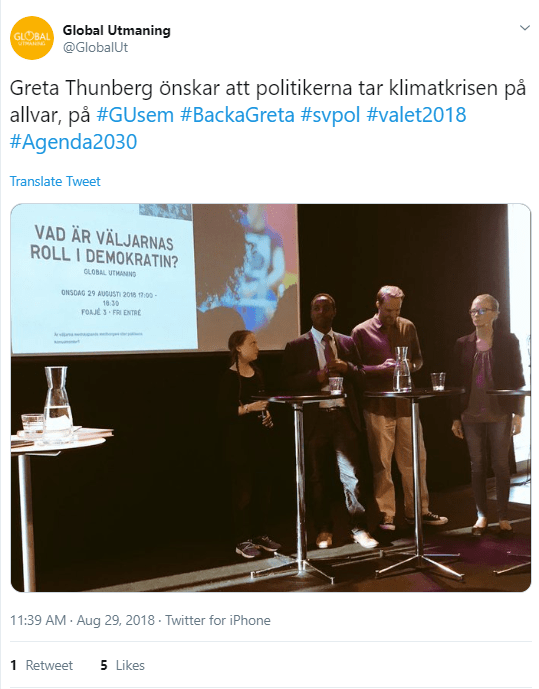
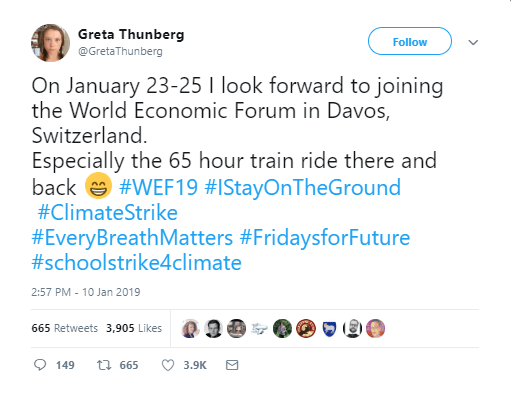

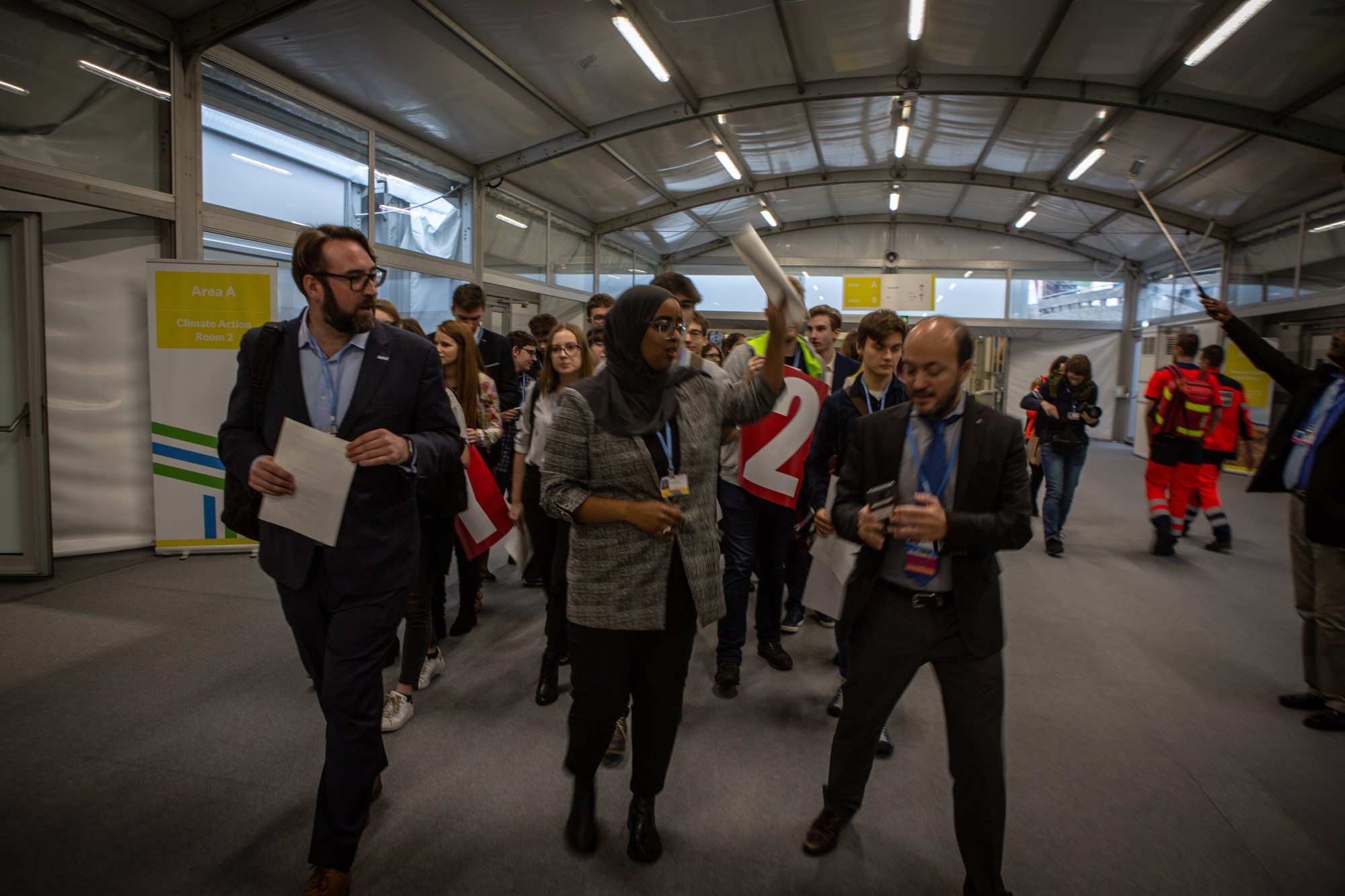
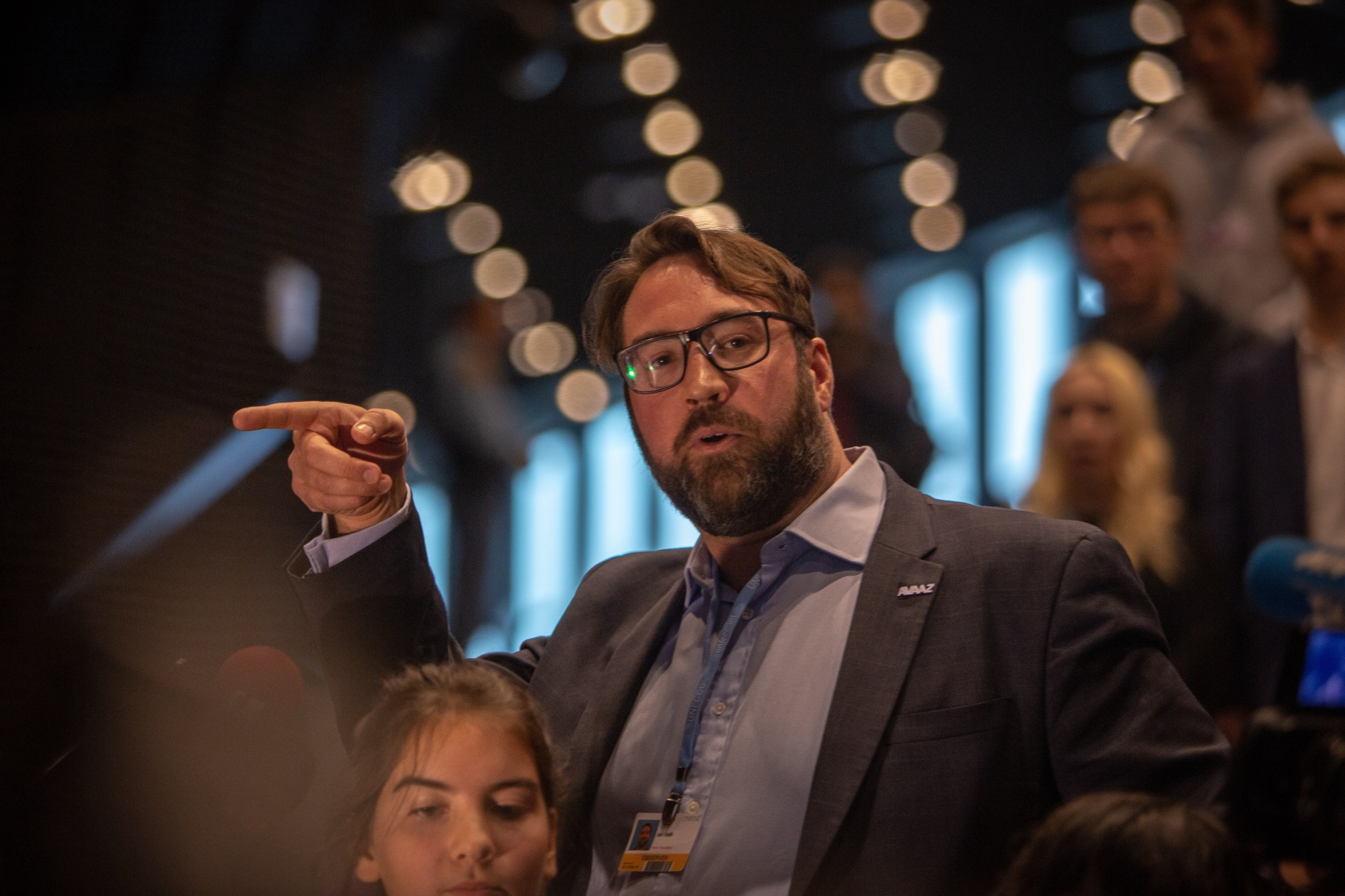
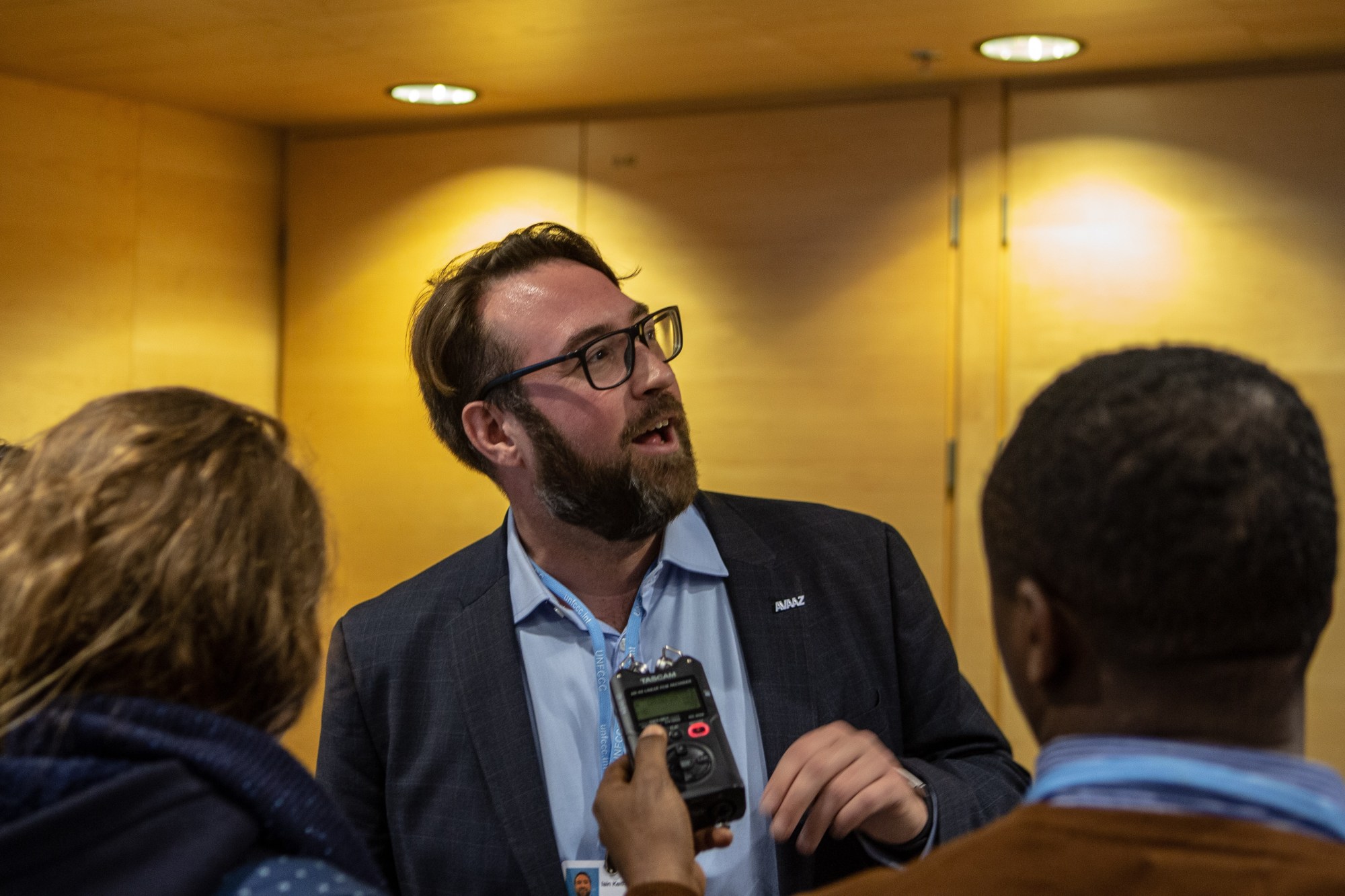
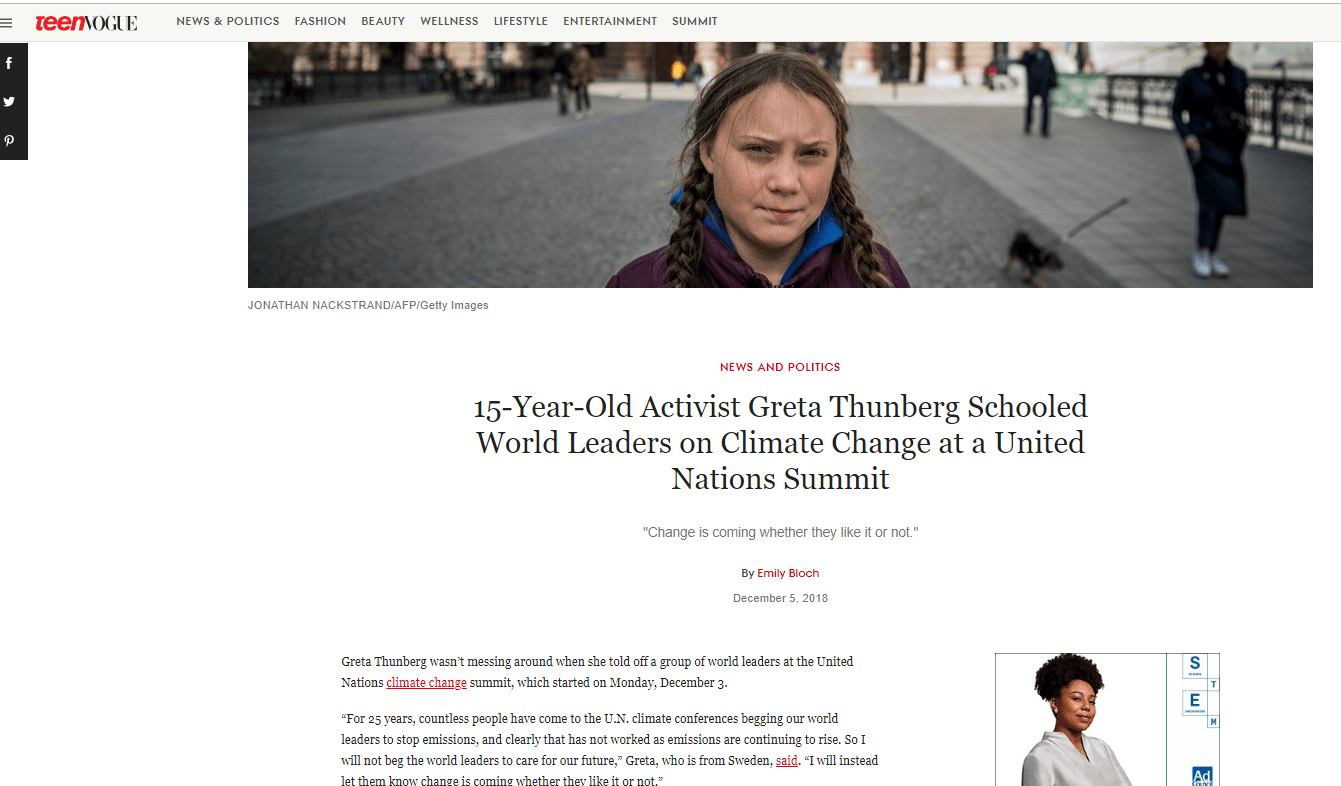
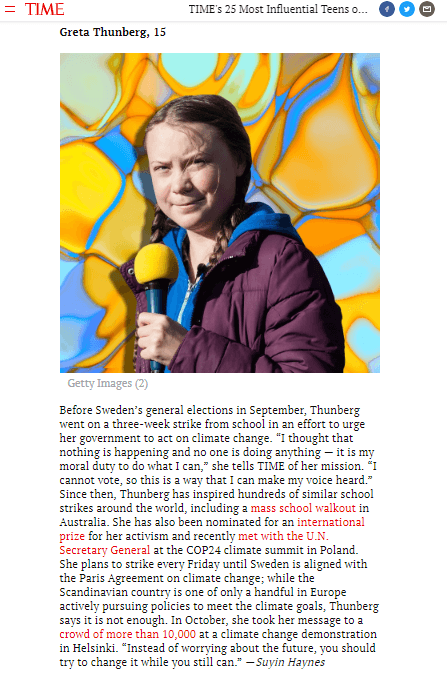
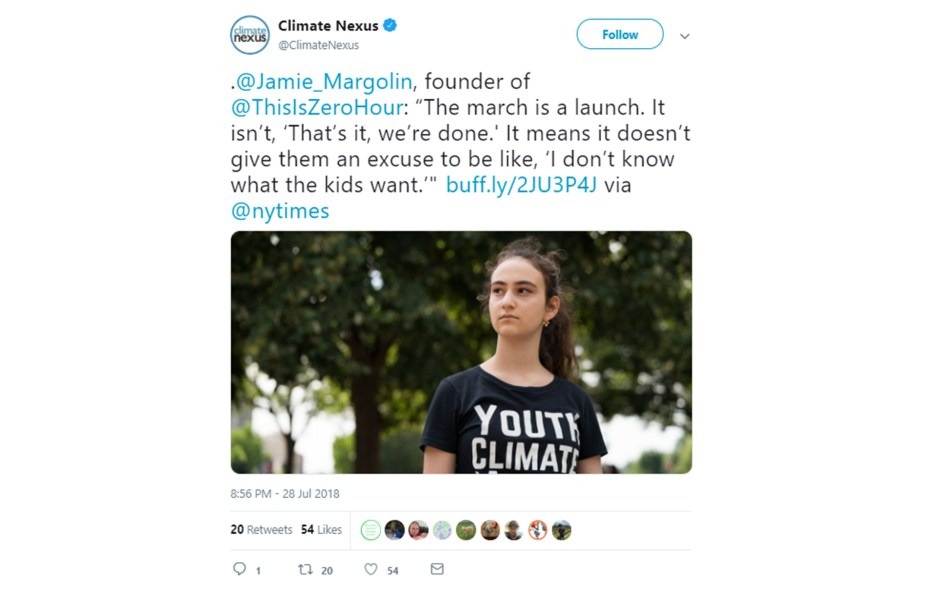

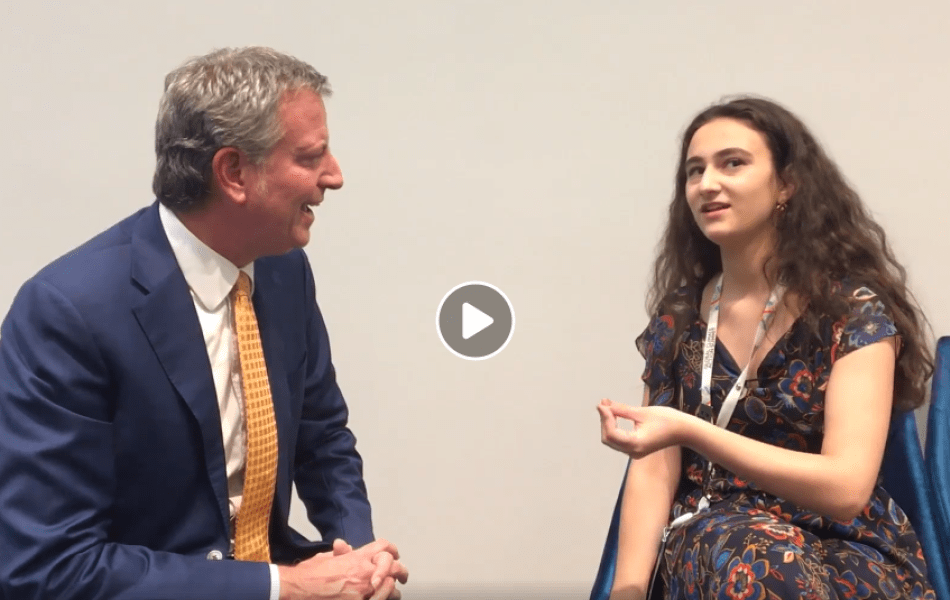
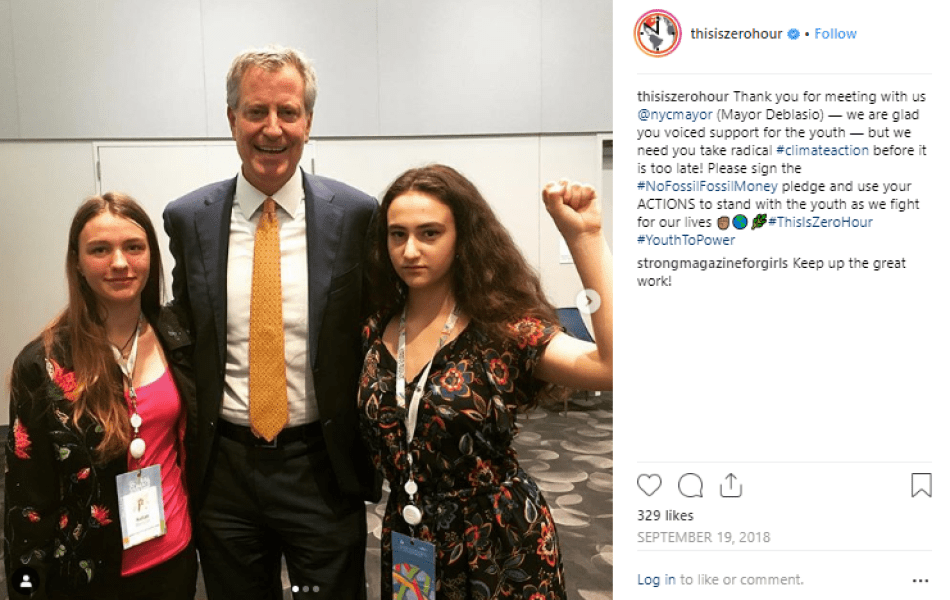
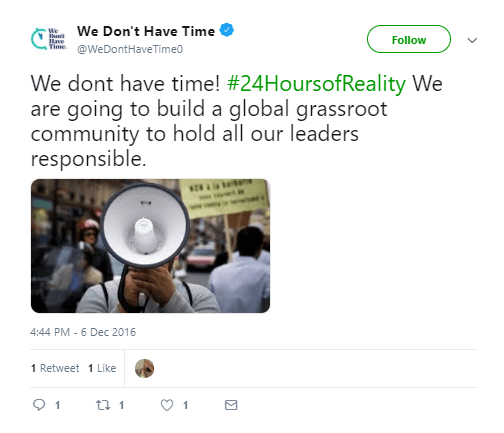
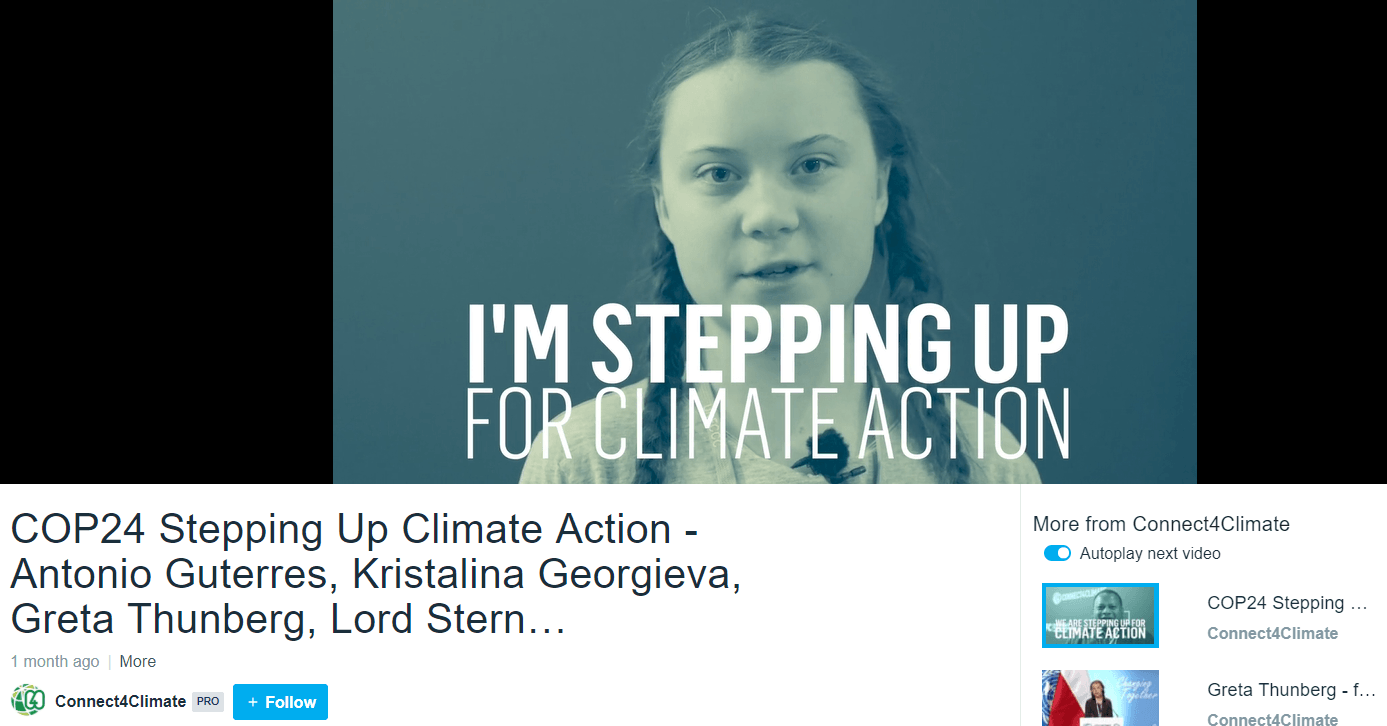




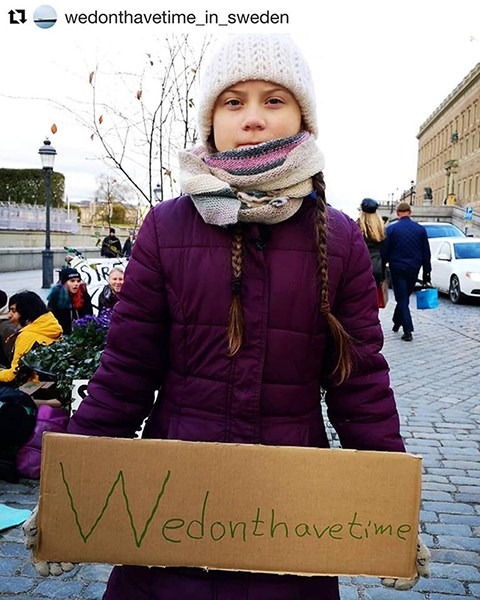

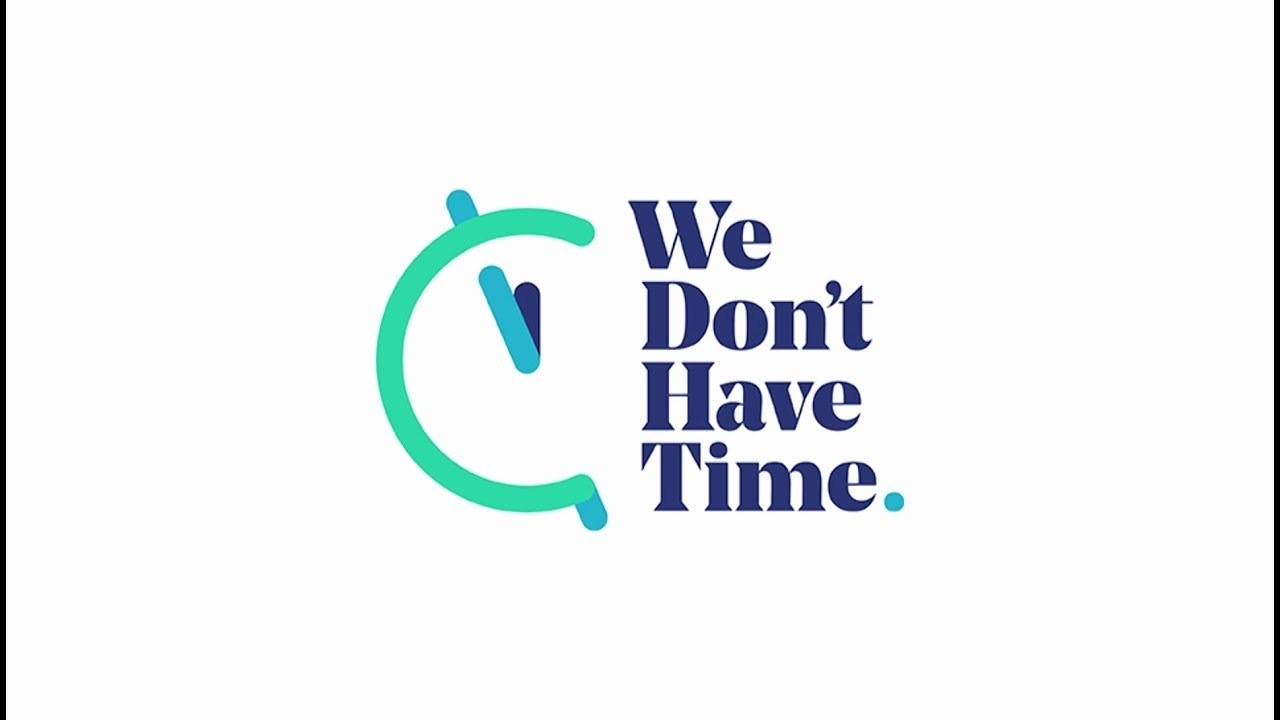
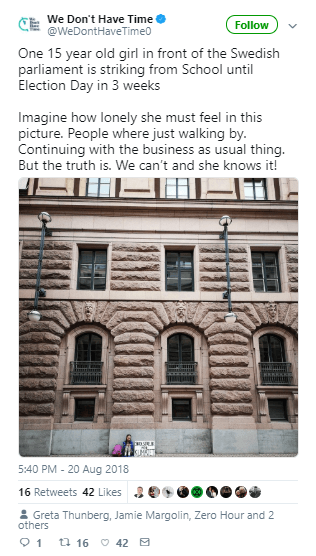
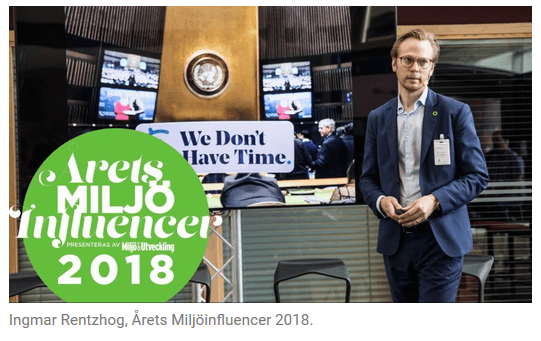



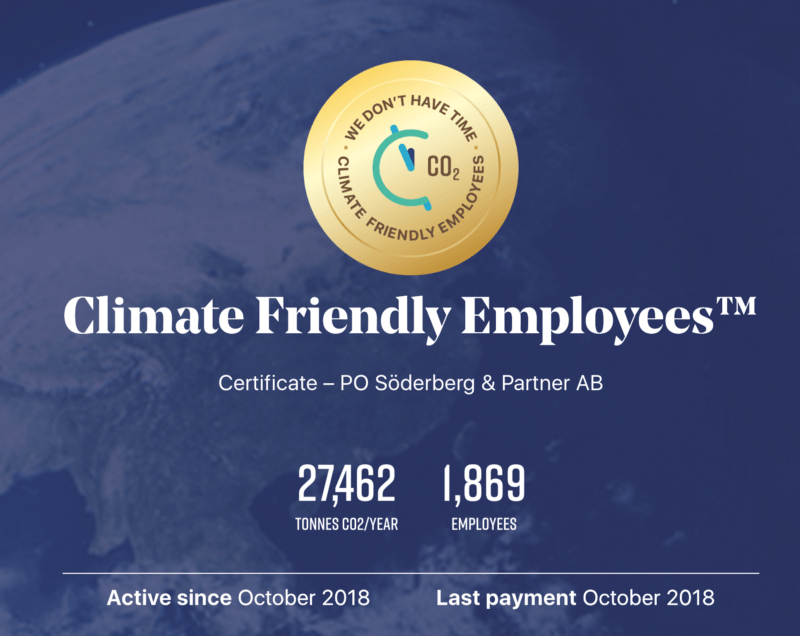


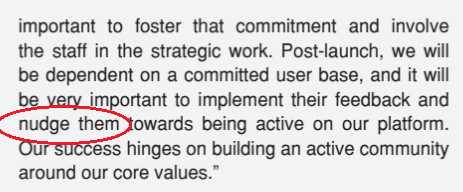

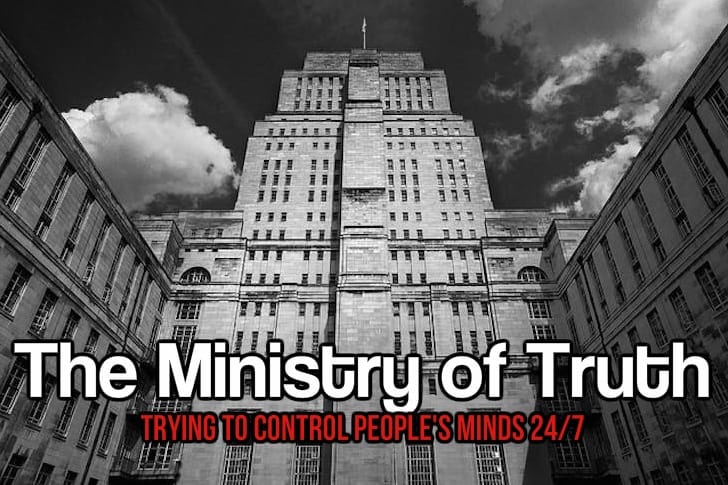


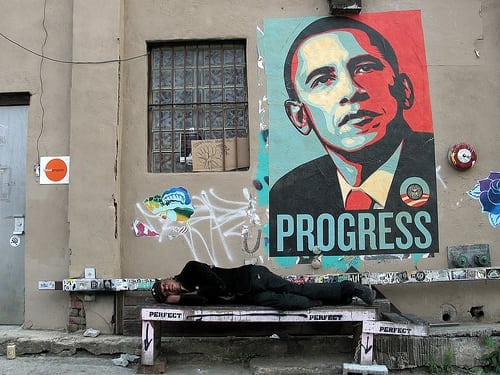








The idea that TripAdvisor is less gamed by fake accounts than Twitter or Facebook and is a reputable company seems a pretty naive one. Really it’s the same model, pretty much you could throw it in the basket with Facebook, Twitter, Uber, Amazon & amazingly expensive electric scooters as things we don’t need, and in fact would be a lot better off without.
In the above investigative report, WKOG is not implying that Trip Advisor is “less gamed” than any the other groups. We are just using that company in a comparative aspect. And if you read the article closely, we never intimate that the groups you mentioned were more or less susceptible to any type of subterfuge. We simply made an analysis in comparing Trip Advisor to ONE company in particular, which was We Don’t Have Time. In your attempt to somehow negate our analysis, you utilized a falsehood in saying that we compared Trip Advisor to these other companies when in fact, we were focusing on the differences between We Don’t Have Time and its particularly shoddy way of doing business.
Therefore to say that some companies aren’t anymore shoddy than others in a capitalist system is to say that you can get the same quality of food or shelter or water or anything else at any given place. Although capitalism puts profit above everything else, including life, there are still various entities that provide goods and services at different levels under that paradigm. Nothing and no one is monolithic as individual people and groups have different reasons and rationales for their actions. The end result is to garner profit. But how it is done varies like the direction of the wind.
For forty-five years I ran a wildlife refuge in a rainforest in Australia. Biology and science were my first teaching subjects and this earned the money to pay for it. I have recently conducted fieldwork with university master of science students in determining biodiversity on my refuge. Carbon Dioxide has nothing to do with the loss of species; rather deforestation, in particular, has everything to do with it. Next is the increasing amount of pollution that poisons soils, water and ocean. The theoretical greenhouse effect does not have an effect on species diversity, they have survived temperature increases and decreases in many times before. This is evidenced in the rocks and ice cores and such temperature changes are driven by the sun. It is criminal to mislead the public on such important matters and those at the front of these campaigns are likely to be making profit or power gains. I have always supported clean energy production, free of the toxic gases like sulfur dioxide and nitrous oxides that come from the burning of coal. It is time to get this straight – carbon dioxide is a trace gas that is not toxic, and it is the least worrisome of the greenhouse gases. Stop land clearing, especially in the Amazon, as large forests are critical for cloud formation throughout the world and we must reduce to nothing the pollution that poisons everything from microbes to man. It is the giant corporations that pollute in vast quantities, as does war.
So far I have only read Act 1. I have now subscribed and will read through all of your offerings in due course. I read for my BSc Environmental Studies, graduating in 1991 and was well aware of man’s impact on the planet even before then. Now in my 60th year, what is left of this planet is of no consequence to me (this crusty old body) except insomuch as it impacts my children, Grandchildren, and humanity in general. That said, according to James Lovelock (Gaia hypothesis) it is of no real consequence to the planet either, only to the human species. For, those below us on the sentient scale, perhaps have no current understanding of the global threat to life. Ergo only humans are cognisant individually to a greater or lesser extent of what we, if it is us, and or the planet’s cyclical events have in store for us and our demise.
Of course I would love to spend whatever time I have left in glorious and selfish enjoyment, providing that does not adversely impact on others. Furthermore, I would love the same to extend to my progeny. Sadly, I fear it will not.
So whilst I agree with your synopsis of what is in part the wrong kind of green, and your (limited by my only reading Act 1) suggested solutions, I feel it is all too little too late. Because, every day we argue over who is right or wrong and the corporatocracy in stealth or otherwise, continue down the road to self destruction, we move one day closer to our species’ final armageddon.
We (Humans) can change, of course. we can resolve the issue and possibly reverse the trend. But will we? I’ll leave that hanging.
My final thoughts on your article are in respect to Greta Thunberg. I accept entirely your assertion that you neither meant nor indeed did, cast aspersions as to her intent, her integrity or her credibility. But, I suggest that using the term ‘manipulated’, to some extent does exactly that. at least in respect the her integrity and credibility. Had you said instead that her actions were being hi-jacked by the (hopefully) well meaning, if erroneous mainstream Climate Change movement organisations I would have been in much more agreement.
You also fail to take account of her statement issued on 11 February 2019 where she states:
“Many people love to spread rumors saying that I have people ”behind me” or that I’m being ”paid” or ”used” to do what I’m doing. But there is no one ”behind” me except for myself. My parents were as far from climate activists as possible before I made them aware of the situation.
I am not part of any organization. I sometimes support and cooperate with several NGOs that work with the climate and environment. But I am absolutely independent and I only represent myself. And I do what I do completely for free, I have not received any money or any promise of future payments in any form at all. And nor has anyone linked to me or my family done so…
I was briefly a youth advisor for the board of the non profit foundation “We don’t have time”. It turns out they used my name as part of another branch of their organisation that is a start up business. They have admitted clearly that they did so without the knowledge of me or my family. I no longer have any connection to “We don’t have time”. Nor does anyone in my family. They have deeply apologised for what has happened and I have accepted their apology.
In the light of her statement, the point or at least very heavy inference in your article that she is intrinsically nestled in ‘We Don’t Have Time’ is simply wrong and disingenuous. A correction by yourselves would be honourable.
Otherwise. Go raibh mile maith agat, maith thú.
Thank you for your comment. In response to “You also fail to take account of her statement issued on 11 February 2019 where she states…”
Act I of our series was published January 17, 2019. ACT II would be published January 21st, and ACT III on Jan. 28th. Miss Thunberg’s much publicized statement was released February 11, 2019 – almost a full month after ACT I of the series was published. At this juncture, the series was gaining much traction.
The Thunberg statement claims that that the CEO of We Don’t Have Time, Ingmar Rentzhog, highlighted Thunberg’s participation with his tech foundation, in his company’s *financial prospectus (published and made public in November of 2018), without Thunberg’s knowledge or permission. That’s fair enough. It still doesn’t change any of the facts presented in ACT I of the series. [*”Financial prospectuses must describe the company’s organizational structure and operations as transparently as possible, to provide decision-making data for potential investors.”]
February 5, 2019 “We Don’t Have Time” newsletter:
“As you undoubtedly know, Ms. Greta Thunberg has become one of this planet’s most sought-after people. She therefore needs to fully devote herself to the worldwide climate strike movement that she has started, and no longer has the time to commit herself to being an advisory board member of the WeDontHaveTime Foundation. She continues to believe in and support our organisation and we will, of course, continue to give her our full support in the future.”
And even beyond the Non Profit Industrial Complex being paid by the plutocrats to serve their own interests, the strategies that focus on climate change inherenctly divert attention from the root cause of this and all other issues, especially in the context of the US empire: the systemic plutocratic corruption of politics. The following linked ebook provides an analysis that “professional activism” as such is the core reason why progressives lack a coherent strategy to recover democracy: http://ssrn.com/abstract=2904722
This book takes a wider view of the same phenomenon uncovered by this excellent series.
Just know that anything sponsored by the United Nations has an underlying agenda. I see this “We have no time” mantra as massaging the public into thinking of rushing a decision and that decision my friends will be this you can bet your boots – to bring in some hairbrained scheme of the geoengineers. And all their schemes are hairbrained. All of them. Because for them it’s about spending wads of YOUR money on more damage to the environment. What we need to do is reduce our consumption and have a rewards system that encourages such actions, grow hemp and kenaf and use rapidly renewable resources to replace petrochemicals. This is not rocket science people! And anything that comes from a centralized agency such as the UN should be automatically dismissed. Local is where it’s at – what you do locally is where our efforts must go. Use citizen media to promote these ideas
Excellent blog confirming thoughts I have been having for quite a while now, and certainly well before Greta came along.
When the CEO/COO of one of these NGO’s takes home more money than the equivalent in a Multinational Corporation, you know the wheels have fallen off the wagon.
Keep doing what you are doing please its vitally important
Epic work. And tireless patience with those who appear to be skim-reading and/or trolling. Your research efforts and journalistic and analytical standards are incredible. And your publishing of these analyses is seemingly too difficult for many to grasp, yet most of these issues are so in all of our faces whilst we collectively choose to ignore or – as so many have been trained to do recently, brand as fake news. Being vegan, I sympathize with the mountainslide of hate and scorn just for wanting to help humans dig their way out of the global shithole we have handed all life on Earth. Subscribing.
Emotional investment? A standard view is “The more emotionally invested you are in anything in your life, the less critical and the less objectively observant you become.” (David JP Phillips, We Don’t Have Time board of directors, “The Magical Science of Storytelling”). I think the opposite is true. Here is my reasoning.
Emotions are an integral part of what makes us human. I have suggested, with respect to the current environmental and climate change issues, that there are two sets of emotions at play, terraphthoran (Earth destroying) and terranascient (Earth creating) emotions. The Earth creating emotions are supported by all that we currently know about biological and climate science.
The terranascient emotions, when connected to science, form an objective foundation for personal and social commitment to certain courses of action, namely, avoiding the sixth great species extinction and catastrophic climate chaos.
We have then, a foundation for hope as the causes we are committed to are not arbitrary or nebulous, they are the strongest possible reasons to do something positive. For life to continue on Earth, particularly human life, we must connect our terranascient emotions to the objective order of life as understood and described by science.
Hence, I re-write the Phillips statement:
“The more terranasciently emotionally invested you are in anything in your life, the more critical and the more objectively observant you become.”
Could you clarify your position and thoughts on the climate degradation caused by Animal Agriculture following on Earl’s comments and your response of 20th March? Some 2.7 trillion fishes and other marine life and 70 billion land mammals (estimated) are slaughtered annually. Then there is species extinction in respect of free living animals, also as a direct result of commodification and interference by humans. The requirement for everyone to adopt a plant-based diet and prioritisation of education on anti-speciesism is being ignored across the board, other than a little lip service here and there.
The Most Important COP Briefing That No One Ever Heard | Truth, Lies, Racism & Omnicide [December 10, 2012]
“Also Ignored by the Non-Profit Industrial Complex at COP15: That industrialized livestock contributes over 50% of all GHG emissions.”
The Real Weapons of Mass Destruction: Methane, Propaganda & the Architects of Genocide | Part III [January 17, 2011]
“What is rarely discussed is the fact that as much as half of the annual worldwide greenhouse gas emissions contributing to climate change are now being attributed to the lifecycle and supply chain of domesticated animals raised for food. The livestock industry also contributes to massive deforestation, causing further acceleration of climate change. Due to the fact previously stated, that methane is a powerful greenhouse gas 72-100 times more powerful than carbon in the short term (5 to 20 years), how can it be that this issue is barely being discussed? Like heart disease – denying this issue constitutes a silent killer.
Livestock now accounts for up to 51% (Worldwatch Institute) of all greenhouse gas emissions. [19] Methane accounts for a vast amount of these emissions. Meat counts for more damage than all transportation combined on our finite planet. In June 2010 the United Nations issued a second urgent plea for a global united transition to a meat-free and dairy-free diet: “A global shift towards a vegan diet is vital to save the world from hunger, fuel poverty and the worst impacts of climate change.” Yet despite urgent warnings from the United Nations (the first in 2006) that countries must reduce meat consumption, this is just another lifestyle change the well-off would rather not discuss, even when this massive dent in emissions would cost nothing – we could all do it today, at our next meal. We could at least begin a transition today. Especially in light that this is one of the few solutions in the mitigation of climate change where citizens are free of government-asserted control over our decision of choice. The fact that it would be more effective in the fight to prevent catastrophic climate change to eliminate animal products from our diets than it would be to eradicate the entire globe of all vehicles of transportation combined is nothing less than incredible.
The fact that we dismiss such a simple action at the cost of future generations is revealing. What it sadly reveals is an increasingly unenlightened society that is effectively becoming more and more corroded by unadulterated individualism.
The Right to Destroy Ourselves
“Nothing will benefit human health and increase chances for survival of life on Earth as much as the evolution to a vegetarian diet.” – Albert Einstein
But why give fair and just transition programs and subsidies to independent farmers for making the critical transition to organic plant-based agriculture when we can just keep giving the billion dollar multinational corporations the vast subsidies to keep destroying our planet? And why give our children – who are at the mercy of our poor decisions – a healthy and compassionate diet when we can slowly kill them with an escalating epidemic of obesity and diabetes, costing the health care system billions? But hey, as long as the cost belongs to the taxpayers while the profits from disease line the pockets of the rich, what’s the problem?
Let’s face it, there is too much money to be made by the multinational corporations, who view our families, and especially our children, as nothing more than neon-flashing dollar signs. There is just too much money to be made on drugs, treatment and disease. Prevention is the enemy of corporate profit. And why even consider transitioning to a healthy plant-based diet when, instead, corporations can set another unknown disaster into motion – in this instance, cloned meat. Our “brilliant” species can do anything – except change the very patterns that destroy our own habitat and ultimately ourselves. Burn baby burn. Drill till we’re dead. Message from corporations to consumers (formerly known as citizens): Stuff yourself with meat, hormones and additives until you explode (or the planet explodes – whichever comes first).
As an exporter of meat, dairy and wool, New Zealand’s highest climate gas emission is methane, despite having a per capita car ownership that rivals California’s. How to fix this? Simple – like the IPCC, the government simply accounts for greenhouse gas emissions but doesn’t add in agricultural methane, even though methane is far more potent than CO2. Presto! Methane is no longer a problem.
There is no choice – if we want to continue living, there must be generous subsidies to assist a global conversion from industrial livestock farming to organic, primarily plant-based, small-scale agriculture rich in biodiversity. Intensive livestock production and the intensive food production for livestock contributes to massive deforestation and loss of biodiversity. Much of the cleared land for livestock could be reforested or returned to grassland – becoming lush carbon sinks rather than degraded lands that emit deadly methane. Conserving biodiversity, as well as feeding humanity, must be a global priority over sustaining factory-farmed livestock.
Like fossil fuels, states must eliminate the massive livestock and dairy subsidies. Such subsidies continue to be accepted and relatively unchallenged as states vie for export dollars by selling meat to other nations. Trade is set to be the number one sector of all fossil fuel consumption by 2030. Further, both the fossil fuel industry and the livestock industry must internalize the full costs of all pollution, including water pollution, CO2 from deforestation, methane from decaying animal parts (among other sources) and nitrous oxide from animal waste.
Will governments create such legislation? Not likely. For behind the red velvet curtain, the corporations run the greatest puppet show on Earth. This certain cause of CO2 and methane is the easiest (and most affordable) one to tackle – yet, almost five years after the initial UN warning we are not even discussing it.
October, 2010: Olivier De Schutter, the UN special rapporteur on the right to food states unequivocally:”There is currently little to rejoice about,” and “worse may still be ahead…. Current agricultural developments are… threatening the ability for our children’s children to feed themselves,” he said. “A fundamental shift is urgently required….” He continued that “giving priority to approaches that increase reliance on fossil fuels is agriculture committing suicide.” Today agriculture continues to decline because of accelerating climate change. Feeding factory-farmed livestock rather than feeding people is just one more slap in the face to human rights and social equity.
October, 2010: Scientists warn of a livestock greenhouse gas boom: “Soaring international production of livestock could release enough carbon into the atmosphere by 2050 to single-handedly exceed ‘safe’ levels of climate change.… The livestock sector’s emissions alone could send temperatures above the 2 degrees Celsius rise commonly said to be the threshold above which climate change could be destabilising.” They also make a more conservative estimate: “The sector will contribute enough greenhouse gas emissions to take up 70 per cent of the ‘safe’ 2 degree temperature rise.” The authors of the study called on governments to prioritize the reining in of the livestock sector, adding that “mobilising the necessary political will to implement such policies is a daunting but necessary prospect.” They suggest the world will have to reduce emissions by roughly 87 per cent relative to performance at a global scale in 2000.
And again, remember that 2ºC was never considered safe. From the 1990 United Nations AGGG report: “Temperature increases beyond 1°C could trigger rapid, unpredictable and non-linear responses that could lead to extensive ecosystem damage.” The absolute temperature limit of 2°C in the same report was motivated as the limit beyond which the risks of grave damage to ecosystems and of non-linear responses are expected to increase rapidly.
In the video below (2011:13:57), The Genetics Myth, Dr Robert Sapolsky, Dr James Gilligan, Dr Gabor Maté and Richard Wilkinson speak of how a society void of ethics, effects our behaviours and emotional health.”
Post Cop15 | Time to be Bold [October 20, 2010]
“There must be generous subsidies to assist a global conversion from industrial livestock farming to organic, primarily plant based small scale agriculture rich in biodiversity. Intensive livestock production and the intensive food production for livestock contributes to massive deforestation and loss of biodiversity. Conserving biodiversity, as well as feeding humanity must be a global priority over sustaining factory-farmed livestock and bio-fuel production.”
10:10:10 – Marketing, Manipulation, and the Status Quo [October 8, 2010]
“Pablo Eisenberg at Georgetown University’s Public Policy Institute has stated, “although we know that our socioeconomic, ecological, and political problems are interrelated, a growing portion of our nonprofit world nevertheless continues to operate in a way that fails to reflect this complexity and connectedness.” This unwillingness to confront the broader issues of climate change such as militarism, livestock, and the capitalistic practices inherent in the current corporatocracy, is at the heart of the crisis of the climate change movement. Behind closed doors, the organizations manipulating and exploiting 10:10:10 know and understand the dilemma created by their infatuation with the corporate power structure. Yet the big greens refuse to advance these fundamental issues. And to be fair, they can’t. For if they were to be effective, in a meaningful way that actually started a paradigm shift, they would quickly be cut off from their generous ‘partners’. These groups have become barriers to the movement. They no longer represent civil society, but stand as walls to protect the system. They utilize the coercive tactic of inviting supposed leaders of civil society into sanitized circles of power, and simultaneously repress the rank and file climate movement.”